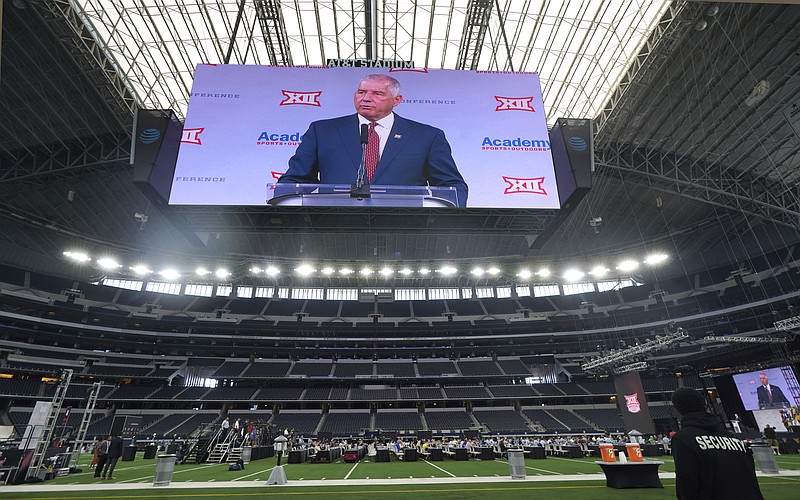Big 12 commissioner Bob Bowlsby has accused ESPN of encouraging other conferences to pick apart the league so Oklahoma and Texas can move to the Southeastern Conference more quickly and without paying a massive buyout.
"I have absolute certainty that they (ESPN) have been involved in manipulating other conferences to go after our members," Bowlsby told The Associated Press on Wednesday after sending a cease-and-desist letter to the network.
The letter addressed to ESPN executive Burke Magnus, president of programming and content, said the Big 12 had become aware the network had taken actions "to not only harm the Big 12 Conference but to result in financial benefits for ESPN."
ESPN, which owns the SEC Network, signed a $3 billion deal with the SEC last year that will give the network the broadcast rights to all of the league's sports starting in 2024. The network also has a rights deal with the Big 12, though it shares those rights with Fox. Those deals expire in 2025.
The Big 12 demanded the network stop "all actions that may harm the Conference and its members and that it not communicate with the Big 12 Conference's existing Members or any other NCAA Conference regarding the Big 12 Conference's Members, possible conference realignment or potential financial incentives or outcomes related to possible conference realignment."
ESPN responded in a one-sentence statement: "The claims in the letter have no merit."
Oklahoma and Texas informed the Big 12 this week they would not renew an agreement that binds them to the league and its eight other members until 2025. The grant of media rights runs concurrently with the Big 12s billion-dollar television contracts with ESPN and Fox.
On Tuesday, Texas and Oklahoma submitted a request to the SEC to join that league in 2025. To join the conference earlier than that could cost the schools tens of millions of dollars - unless the Big 12 were to fall apart because some of the other members left as well.
"ESPN is incentivizing other conferences to destabilize the Big 12," Bowlsby added.
ESPN owns the rights to all Atlantic Coast Conference athletics and has an exclusive deal with the American Athletic Conference. The network also has current rights agreements with the Big Ten and Pac-12, though it shares those with Fox, too.
Bowlsby told AP that Oklahoma and Texas have been working on a move to the SEC for months, doing so while taking part in Big 12 strategy meetings in which proprietary information was shared. Bowlsby said he suspects ESPN was involved behind the scenes when Oklahoma and Texas were in discussions with the SEC, but he has no proof of that.
"This whole thing has been a complete articulation of deception," he said.
SEC university presidents and chancellors are scheduled to meet Thursday, but it is unclear if they will vote on extending invitations to conference to Oklahoma and Texas. SEC bylaws state 11 of the 14 league schools would need to vote in favor of inviting a new member, and it appears that won't be a problem.
Texas A&M officials had voiced their displeasure last week with the possibility of old rival Texas joining the SEC, but A&M's board of regents on Wednesday directed school president Katherine Banks to vote in favor of both the Longhorns and Oklahoma's Sooners coming aboard.
Bad news for Bush
The NCAA said Wednesday it will not reconsider penalties handed down for infractions cases, a decision that will keep former University of Southern California running back Reggie Bush from having his 2005 Heisman Trophy honor restored.
Earlier this month, the Heisman Trust said it would return the trophy to Bush if the NCAA were to reinstate him for the 2005 season.
The NCAA released a statement saying that recent changes to rules regarding how athletes can be compensated for their names, images and likenesses still do not permit "pay-for-play type arrangements."
"The NCAA infractions process exists to promote fairness in college sports," the statement read. "The rules that govern fair play are voted on, agreed to and expected to be upheld by all NCAA member schools. Previous penalties, including those that are several years old, will not be re-evaluated or reconsidered based on the recent changes to NIL rules."
Bush had his Heisman victory vacated after the NCAA ruled he received impermissible benefits while playing at USC. The games Bush played in for the Trojans in 2005 were also vacated after he was deemed ineligible because of the NCAA violations.
When the NCAA lifted its restrictions on athletes earning money for things such as endorsements and personnel appearances on July 1, Bush made a public appeal for his Heisman to be returned.
"It is my strong belief that I won the Heisman Trophy solely due to my hard work and dedication on the football field and it is also my firm belief that my records should be reinstated," Bush said in a statement at that time.
